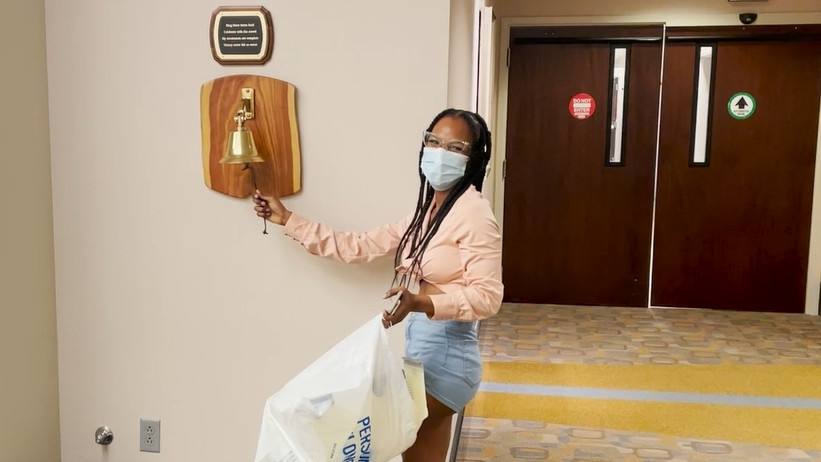
Breast cancer does not discriminate ― a truth that a young Florida woman knows three times over. While in college, Jessica Florence found a lump on her right breast. The 21-year-old initially did not believe what she found was serious until she was in pain and experiencing other symptoms.
Watch: A third chance for a young breast cancer patient.
Journalists: Broadcast-quality video (2:00) is in the downloads at the end of this post. Please courtesy "Mayo Clinic News Network." Read the script.
"When I think of breast cancer, I think of, you know, an older woman ― 40 or 60 ― but not 21 or 22," says Jessica.
With a healthy lifestyle and no family history of breast cancer, Jessica brought her concerns to her primary care provider.
"My gynecologist told me that it could not be breast cancer because I was too young to have breast cancer," says Jessica.
Her instincts, however, led her to seek a second opinion. By the time someone paid attention, Jessica was diagnosed with stage 3 breast cancer.
"African American women are twice as likely to be diagnosed with breast cancer earlier when compared to Caucasian women, and unfortunately, they have three times the mortality rate," says Sabrina Sahni, M.D., an oncologist and breast specialist at the Jacoby Center for Breast Health at Mayo Clinic in Florida.
After surgery, radiation and chemotherapy, Jessica was looking forward to renewed health. But months later, Jessica's cancer was back, and this time it had spread to her spine. Knowing she needed other options, Jessica turned to Mayo Clinic.
"I will say Mayo Clinic has been the best thing that has ever happened to me," says Jessica.
Dr. Sahni explains younger women may not consider themselves to be at high risk, but the reality is breast cancers are diagnosed at all ages.
"Women across the board, regardless of ethnicity, should really be counseled to check their breasts," says Dr. Sahni.
Jessica recognizes her chance to change the stigma around cancer and has chronicled her journey on social media.
"There are a lot of African American women who go through breast cancer who don't tell their story," says Jessica. "So I kind of made my social media my diary, and I know it helped a lot of women."
Jessica's story is a reminder to all women to be vigilant when it comes to changes in their bodies.
"If they feel something, they should really say something about it, and they should not feel, you know, like, I'm too young," says Dr. Sahni.
Jessica continues to receive chemotherapy between architecture classes, which she is attending remotely. Her strength and spirit are on display at every appointment, right down to her bright pink running shoes.
"Tomorrow is not promised to any of us," says Jessica. "So a year from now, I see myself successful ― being that successful architect that I want to be because Mayo Clinic gave me that quality of life," says Jessica.
________________________________________
For the safety of its patients, staff and visitors, Mayo Clinic has strict masking policies in place. Anyone shown without a mask was either recorded prior to COVID-19 or recorded in a nonpatient care area where social distancing and other safety protocols were followed.







